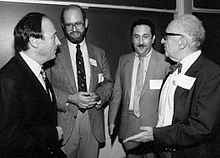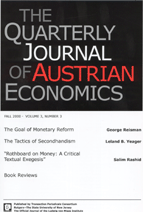Mises Institute
| Founder(s) | Lew Rockwell, Murray Rothbard, Burton Blumert, Henry Hazlitt |
|---|---|
| Established | 1982 |
| Focus | Economics education, Austrian economics, libertarianism, classical liberalism |
| Faculty | 350+[1] |
| Staff | 21 |
| Key people | Lew Rockwell (Chairman) Jeff Deist (President) Joseph Salerno (Editor Quarterly Journal of Austrian Economics) |
| Budget | Revenue: $4,200,056 Expenses: $4,165,289 (FYE 2017)[2] |
| Location | , Alabama , United States |
| Website | mises |
| Part of a series on the |
| Austrian School |
|---|
 |
|
|
This article may contain excessive or inappropriate references to self-published sources. (November 2021) |
The Ludwig von Mises Institute for Austrian Economics, or Mises Institute, is a libertarian nonprofit think tank located in Auburn, Alabama, United States.[2][3] It is named after Austrian School economist Ludwig von Mises (1881–1973).
It was founded in 1982 by Lew Rockwell, Burton Blumert, and Murray Rothbard,[4] following a split between the Cato Institute and Rothbard, who had been one of the founders of the Cato Institute.[non-primary source needed][5] It was funded by Ron Paul.[3]
Background and location[]

The Ludwig von Mises Institute was founded in 1982 by Lew Rockwell. Rockwell, who had previously served as editor for Arlington House Publishers, received the blessing of Margit von Mises during a meeting at the Russian Tea Room in New York City, and she was named the first chairman of the board.[6][7][self-published source?] Early supporters of the Institute included F.A. Hayek, Henry Hazlitt, Murray Rothbard, Ron Paul, and Burt Blumert.[4][non-primary source needed] According to Rockwell, the motivation of the institute was to promote the specific contributions of Ludwig von Mises, who he feared was being ignored by libertarian institutions financed by Charles Koch and David Koch. As recounted by Justin Raimondo, Rockwell said he received a phone call from George Pearson, of the Koch Foundation, who had said that Mises was too radical to name an organization after or promote.[8]
Rothbard served as the original academic vice president of the institute. Paul agreed to become distinguished counselor and assisted with early fundraising.[4][non-primary source needed]
Judge John V. Denson assisted in the Mises Institute becoming established at the campus of Auburn University.[9] Auburn was already home to some Austrian economists, including Roger Garrison. The Mises Institute was affiliated with the Auburn University Business School until 1998 when the institute established its own building across the street from campus.[10][non-primary source needed]
Kyle Wingfield wrote a 2006 commentary in The Wall Street Journal that the Southern United States was a "natural home" for the institute, as "Southerners have always been distrustful of government," with the institute making the "Heart of Dixie a wellspring of sensible economic thinking."[5]
Its academic programs include Mises University, Rothbard Graduate Seminar, the Austrian Economics Research Conference, and a summer research fellowship program. In 2020, the Mises Institute began offering a graduate program.[11] It has led to the creation of spin-off organizations around the world, including Brazil,[12][better source needed] Germany,[13] South Korea,[14][better source needed] and Turkey.[15][non-primary source needed]
Views[]
Economic[]
A defining philosophy of the institute is Misesian praxeology ('the logic of human action'), which holds that economic science is deductive rather than empirical. Developed by Ludwig von Mises, following the Methodenstreit opined by Carl Menger, it opposes the mathematical modeling and hypothesis-testing used to justify knowledge in neoclassical economics. Misesian economics is a form of heterodox economics.[16] This emphasis on Misesian methodology is distinct from other scholars in the Austrian tradition, including Hayek and those associated with George Mason University.[17]
Political[]
The Mises Institute has been criticized by some libertarians for the paleolibertarian and right-wing cultural views of some of its leading figures, on topics such as race, immigration, and the presidential campaigns of Donald Trump.[18][19][20][21]
In the late 1980s and early 1990s, Rockwell and Rothbard embraced racial and class resentments to build a coalition with populist paleoconservatives.[18] This rhetoric appeared at the time in newsletters for Ron Paul that Rockwell was later identified as writing, including statements against black people and gay people that later became controversies in Paul's congressional and presidential campaigns.[18][3] Separately, Rothbard's writing opposed "multiculturalists" and "the entire panoply of feminism, egalitarianism".[3]
A 2000 report by the Southern Poverty Law Center (SPLC) categorized the Mises Institute as Neo-Confederate, "devoted to a radical libertarian view of government and economics."[22] In 2003, Chip Berlet of the SPLC described the institute as "a major center promoting libertarian political theory and the Austrian School of free market economics", noted Rothbard's disgust with child labor laws, and wrote that other institute scholars held anti-immigrant views.[23]
When a New York Times reporter requested a tour of the institute in 2014, Rockwell asked him to leave, saying he was "part of the regime."[3]
Candice Jackson, who served as acting head of the U.S. Department of Education Office for Civil Rights during the Trump Administration, was previously a summer fellow at the Mises Institute.[24]
Publications[]


The Mises Institute makes available a large number of books, journal articles, and other writings online, and archives various writings on its website. Its Quarterly Journal of Austrian Economics discusses Austrian economics. It published the Journal of Libertarian Studies from 1977 to 2008.[citation needed]
Notable faculty[]
Notable figures affiliated with the Mises Institute include:[25][non-primary source needed]
- Walter Block – Austrian School economist and anarcho-capitalist; economics professor at Loyola University New Orleans
- Godfrey Bloom – British politician, former Member of the European Parliament
- Thomas DiLorenzo – economics professor at Loyola University Maryland
- Paul Gottfried – paleoconservative author, former Professor of Humanities at Elizabethtown College
- Hans-Hermann Hoppe – philosopher, paleolibertarian, business professor at University of Nevada, Las Vegas, and founder of Property and Freedom Society
- Jesús Huerta de Soto – Professor of Applied Economics at King Juan Carlos University
- Peter Klein – Professor of Entrepreneurship and Senior Research Fellow with the Center for Entrepreneurship & Free Enterprise at Baylor University[26]
- Robert P. Murphy – economist, Institute for Energy Research
- Andrew Napolitano – Fox News pundit and former judge
- Gary North – co-founder of Christian reconstructionism and founder of Institute for Christian Economics
- Ron Paul – physician, author, and former congressman
- Ralph Raico (1936–2016) – historian and libertarian specializing in European classical liberalism and Austrian economics
- Murray Rothbard (1926–1995) – heterodox economist, paleolibertarian theorist, polemicist, revisionist historian, and founder of anarcho-capitalism
- Joseph Sobran (1946–2010) – journalist, contributor to American Renaissance and lecturer at the Institute for Historical Review
- Mark Thornton – Austrian School economist[27]
- Joseph T. Salerno – academic vice president of the Mises Institute, Professor of Economics at Pace University, and editor of the Quarterly Journal of Austrian Economics
- Thomas Woods – historian, political analyst, and author
See also[]
References[]
- ^ "Mises Academy:What Is The Mises Institute; What We Do". June 18, 2014.
- ^ a b "Mises Institute in Charity Navigator". Charity Navigator. Retrieved June 5, 2019.
- ^ a b c d e Tanenhaus, Sam; Rutenberg, Jim (January 25, 2014). "Rand Paul's Mixed Inheritance". New York Times. Retrieved February 20, 2014.
- ^ a b c "The Story of the Mises Institute". Mises Institute. September 18, 2018.
- ^ a b Wingfield, Kyle (August 11, 2006). "Von Mises Finds A Sweet Home In Alabama". Wall Street Journal. ISSN 0099-9660. Retrieved December 19, 2020.
- ^ "30 Years of Bedeviling the Bad Guys". Mises Institute. October 1, 2012.
- ^ "Biography of Margit von Mises: 1890–1993". Mises Institute. August 18, 2014.
- ^ Raimondo, Justin (2000). Enemy of the State: The Biography of Murray Rothbard. Prometheus.
- ^ "Why the Mises Institute Is in Auburn". Mises Institute. October 9, 2018.
- ^ "Mises and Liberty". Mises Institute. September 15, 1998.
- ^ "Graduate Program". Mises Institute. March 26, 2020.
- ^ https://mises.org.br/
- ^ "Ludwig von Mises Institut Deutschland".
- ^ miseskorea.org
- ^ misesenstitusu.com
- ^ Lee, Frederic S.; Cronin, Bruce C.; McConnell, Scott; Dean, Erik (2010). "Research Quality Rankings of Heterodox Economic Journals in a Contested Discipline". American Journal of Economics and Sociology. 69 (5): 1409–1452. doi:10.1111/j.1536-7150.2010.00751.x.
- ^ "Socialism: The Calculation Problem Is Not the Knowledge Problem". Mises Institute. March 13, 2018.
- ^ a b c Sanchez, Julian; Weigel, David (January 16, 2008). "Who Wrote Ron Paul's Newsletters?". Reason. Retrieved December 28, 2020.
- ^ Sheffield, Matthew (September 2, 2016). "Where did Donald Trump get his racialized rhetoric? From libertarians". Washington Post. ISSN 0190-8286. Retrieved December 28, 2020.
- ^ Rutenberg, Jim; Kovaleski, Serge F. (December 26, 2011). "Paul Disowns Extremists' Views but Doesn't Disavow the Support (Published 2011)". The New York Times. ISSN 0362-4331. Retrieved December 28, 2020.
- ^ Welch, Matt (July 4, 2018). "Libertarian Party Rebuffs Mises Uprising". Reason. Retrieved September 18, 2020.
- ^ "The Neo-Confederates". Intelligence Report. Southern Poverty Law Center. Summer 2000.
- ^ Berlet, Chip (Summer 2003). "Into the Mainstream". Intelligence Report. Southern Poverty Law Center. Retrieved September 24, 2013.
- ^ Waldman, Annie. "DeVos Pick to Head Civil Rights Office Once Said She Faced Discrimination for Being White". ProPublica.
- ^ "Faculty Members". Ludwig von Mises Institute.
- ^ "Peter Klein". Baylor University's Hankamer School of Business. Retrieved December 22, 2017.
- ^ "Senior Fellows, Faculty Members, and Staff". Ludwig von Mises Institute.
External links[]
| Wikimedia Commons has media related to Mises Institute. |
- Official website
- EDIRC listing (provided by RePEc)
Coordinates: 32°36′24″N 85°29′29″W / 32.60664°N 85.49128°W
- Mises Institute
- 1982 establishments in Alabama
- Auburn, Alabama
- Austrian School
- Book publishing companies of the United States
- Educational charities based in the United States
- Libertarian organizations based in the United States
- Non-profit organizations based in Alabama
- Think tanks established in 1982
- Political and economic think tanks in the United States
- Private universities and colleges in Alabama
